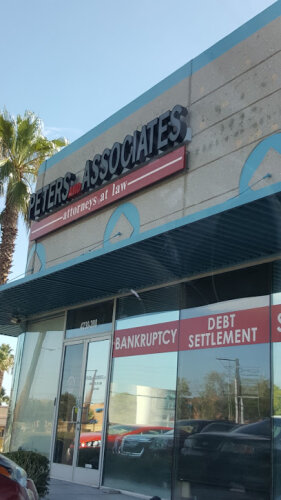Best Brokerage Lawyers in Las Vegas
Share your needs with us, get contacted by law firms.
Free. Takes 2 min.
Free Guide to Hiring a Real Estate Lawyer
List of the best lawyers in Las Vegas, United States
About Brokerage Law in Las Vegas, United States
Brokerage law covers the legal framework that governs brokers and brokerage firms who act as intermediaries in transactions - most commonly in real estate, securities, mortgage lending, insurance and other financial services. In Las Vegas the regulatory landscape includes a mix of federal rules - such as securities laws and federal consumer finance rules - and state and local requirements enacted by Nevada agencies and local governments. Brokers must meet licensing standards, follow rules about client disclosure and fiduciary duties, keep accurate records and handle client funds according to prescribed trust-account rules. When things go wrong - disputes over commissions, allegations of fraud or licensing violations - the matter may be handled by administrative regulators, arbitration forums or civil courts.
Why You May Need a Lawyer
Brokerage matters often involve significant money, complex contracts and strict regulatory requirements. You may need a lawyer in Las Vegas if you encounter any of the following situations:
- Licensing problems - for example a denial, suspension or revocation of a broker or agent license.
- Contract disputes - disputes over listing agreements, buyer-broker agreements, commission splits or brokerage service contracts.
- Allegations of misconduct - accusations such as negligence, breach of fiduciary duty, misrepresentation or fraud.
- Regulatory investigations or enforcement actions - inquiries by state regulators, criminal referral risk or administrative hearings.
- Securities or investment disputes - customer claims against securities brokers, broker-dealers or investment advisers, which often proceed through FINRA arbitration or federal courts.
- Handling of client funds - problems with escrow, trust accounts, commingling of funds or alleged conversion.
- Complex transactions - high-value real estate deals, development projects, or cross-border or multi-party deals where contract drafting and risk allocation are critical.
- Litigation and arbitration - when negotiations fail and you must defend or pursue a claim in court or before an arbitration panel.
Local Laws Overview
Las Vegas brokerage activity is regulated at multiple levels. Key local and state issues to understand include:
- Licensing and registration - Brokers and agents must be licensed by the applicable Nevada state regulator for their line of business. Licensing often requires education, testing, background checks and continuing education.
- Fiduciary duties and agency law - Nevada law and professional rules define duties owed to clients, such as loyalty, disclosure, compliance with instructions and reasonable care. The exact scope depends on whether a broker acts as an agent, dual agent or transaction broker.
- Trust accounts and handling of client funds - Real estate and certain financial brokers must keep client funds in designated trust or escrow accounts and follow strict recordkeeping and accounting rules.
- Advertising, marketing and disclosure - State rules require truthful advertising and full disclosure of material facts. Failure to disclose key information can lead to administrative penalties or civil liability.
- Consumer protection and anti-fraud rules - Nevada enforces consumer protection laws in addition to federal securities laws. Anti-fraud rules apply broadly to misstatements, omissions or deceptive practices.
- Regulatory enforcement - The Nevada state regulator for the specific industry handles licensing and enforcement. For securities matters federal regulators and self-regulatory organizations - including the Securities and Exchange Commission and FINRA - may also have jurisdiction. Administrative hearings can precede or replace court actions.
- Local business licensing and zoning - City of Las Vegas and Clark County business license requirements can affect brokerage operations and office locations.
- Alternative dispute resolution - Many brokerage disputes - especially in the securities context - proceed via arbitration rather than court. Real estate commission disputes and many commercial brokerage disputes also commonly use mediation or arbitration clauses.
Frequently Asked Questions
What kinds of brokers are regulated in Las Vegas?
Multiple types of brokers operate under distinct regulatory regimes: real estate brokers, securities brokers and broker-dealers, mortgage brokers, insurance brokers and certain financial service intermediaries. Each category has its own licensing authority, rules and compliance obligations.
How do I check whether a broker is licensed and in good standing?
You can contact the state agency that licenses the type of broker involved. State licensing agencies maintain records of active licenses, disciplinary history and licensing status. If you are unsure which agency applies, a local attorney or the Nevada state business regulator can help identify the correct office.
What should I do if I suspect my broker committed fraud or misrepresented information?
Preserve all communications and documents, stop transferring funds, and consult an attorney experienced in the relevant area. You may need to file a complaint with the state regulator, and in securities cases you may submit a complaint to the broker-dealer and FINRA. An attorney can advise whether to pursue civil claims, arbitration or to seek injunctive relief.
Can I recover a commission if a sale falls through or a client changes their mind?
Recovery of commissions depends on the contract terms, the reason the sale failed and applicable law. Written agreements, performance milestones and compliance with agency duties are critical. Consult a lawyer to review the listing or brokerage agreement and explain your contractual and equitable remedies.
What are common defenses brokers raise in disputes?
Common defenses include compliance with contractual terms, disclosure of material facts, absence of causation or damages, statute of limitations, good faith reliance on client instructions and that the alleged harm resulted from third-party actions or market conditions rather than broker conduct.
How are securities brokerage disputes usually resolved?
Securities disputes frequently proceed through FINRA arbitration if the customer agreement includes an arbitration clause. Arbitration is often faster and private compared with litigation, but it involves different procedures and remedies. A securities litigator can explain strategy, timelines and potential outcomes.
What are a broker's fiduciary duties to a client in Nevada?
A broker generally owes duties of loyalty, disclosure, care and confidentiality. The specific duties depend on how the relationship is structured and whether the broker represents one or more parties in the transaction. Violations of fiduciary duties can give rise to administrative discipline and civil claims for damages.
How long do I have to bring a legal claim against a broker?
Time limits - called statutes of limitations - vary by the type of claim and the governing law. Some claims have relatively short deadlines, so it is important to consult an attorney promptly to preserve your rights and avoid missing filing deadlines.
What happens if a broker mishandles client funds or misuses a trust account?
Mishandling client funds can lead to criminal charges, administrative license discipline and civil liability. Regulators may require audits, restitution and disciplinary sanctions. An affected client should preserve records and seek legal counsel to evaluate remedial actions and potential recovery options.
How do I choose the right lawyer for a brokerage dispute in Las Vegas?
Look for lawyers with specific experience in the relevant brokerage area - real estate, securities, mortgage or insurance. Ask about prior cases, outcomes, familiarity with administrative bodies and arbitration forums, fee structure and communication style. Confirm the attorney is licensed in Nevada and has experience with local courts and regulators.
Additional Resources
Several agencies and organizations can be helpful when researching brokerage issues or filing complaints. Relevant bodies include state licensing agencies for real estate, securities and financial institutions, local business licensing offices in the City of Las Vegas and Clark County, and federal regulators and self-regulatory organizations for securities matters. Consumer protection offices, the Nevada State Bar for lawyer referrals and local legal aid and consumer advocacy groups can provide guidance. Industry associations may offer education and best-practice materials relevant to brokers and consumers alike.
Next Steps
If you need legal assistance for a brokerage matter in Las Vegas follow these steps:
- Gather documents - collect contracts, communications, receipts, escrow records and any evidence that bears on the dispute.
- Preserve evidence - keep originals and make copies; do not delete electronic messages or dispose of physical records.
- Avoid unilateral fixes - do not sign new agreements or make payments without legal advice if a dispute exists.
- Contact a qualified attorney - choose a lawyer with experience in the specific brokerage area and ask about their approach, fees and likely timelines.
- Consider immediate protective actions - an attorney can advise about temporary relief, filing a regulatory complaint, or steps to prevent dissipation of assets.
- Evaluate dispute resolution options - understand whether arbitration, mediation, administrative hearings or litigation is most appropriate.
Acting promptly and getting specialized legal advice will protect your rights and improve the chances of a favorable outcome in complex brokerage disputes.
Lawzana helps you find the best lawyers and law firms in Las Vegas through a curated and pre-screened list of qualified legal professionals. Our platform offers rankings and detailed profiles of attorneys and law firms, allowing you to compare based on practice areas, including Brokerage, experience, and client feedback.
Each profile includes a description of the firm's areas of practice, client reviews, team members and partners, year of establishment, spoken languages, office locations, contact information, social media presence, and any published articles or resources. Most firms on our platform speak English and are experienced in both local and international legal matters.
Get a quote from top-rated law firms in Las Vegas, United States — quickly, securely, and without unnecessary hassle.
Disclaimer:
The information provided on this page is for general informational purposes only and does not constitute legal advice. While we strive to ensure the accuracy and relevance of the content, legal information may change over time, and interpretations of the law can vary. You should always consult with a qualified legal professional for advice specific to your situation.
We disclaim all liability for actions taken or not taken based on the content of this page. If you believe any information is incorrect or outdated, please contact us, and we will review and update it where appropriate.











